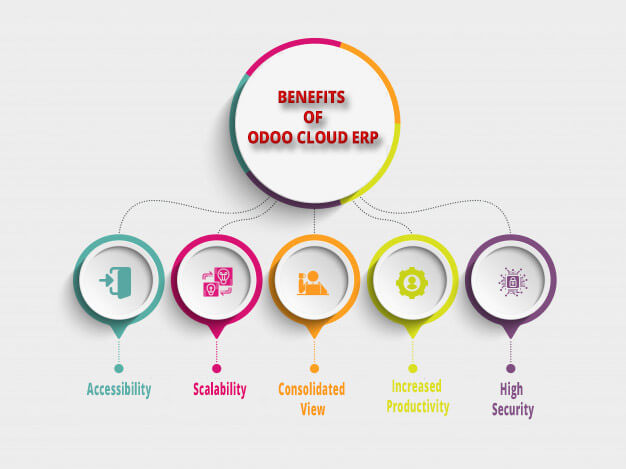The competition in the digital space calls out for innovative business solutions that tend to accelerate business growth and operational efficiency. With the passage of time, the need for businesses to adopt cutting-edge software has become the need. Whether it is to relate with respect to achieving a competitive advantage or believing in scalability, technology now plays a critical role in paving the road to success for businesses.
Latest Trend – Odoo and Cloud ERP
Odoo is one-in-all business software that employs technical solutions for businesses to streamline operations and activities on daily basis. Each simplified module then contributes to the effectiveness of business growth and high business revenue. Odoo provides an exceptionally build Enterprise Resource Planning (ERP) software to businesses to manage a wide range of processes from all aspects through one interface. The trend of ERP software is prevailing in enterprises. The ERP market is growing rapidly with an expected growth of $181.5 billion by 2023 with a CAGR of 8% from 2021.
Consequently, the digital space demands online solutions to align services with the needs of customers. Cloud-based ERP systems are grooving in business operations and had a 20.7% enterprise application growth rate in the public cloud in 2018. The projection is expected to increase to $226.9 billion by 2022. A cloud-based ERP software incorporates an array of enterprise software that addresses business requirements in an efficient manner. Odoo provides a cloud-based ERP solution that encapsulates Human Resource Management (HRM), Order Management, Customer Relationship Management (CRM), etc. in a centralized interface. To attain a consistent growth pattern, IT segments are investing in cloud-based business software that is easy to manage, operate, and access. A consolidated interface provides all information at once glance that makes it highly dexterous to get an idea in an efficient way.
Read: A Detailed Insight to Odoo Implementation – Challenges, Methodology, Concepts & Phases
Open-source Development Model
Odoo has a family of apps that work in collaboration with each other seamlessly and provide support to the overall business infrastructure. From automation to tracking the activities, an open-source development model of Odoo serves as a centralized, accessible, and online platform that can be accessed from anywhere in the world through any device. Odoo has developed an ecosystem of fully integrated business apps that address business needs in a highly comprehensive manner. The unique framework of Odoo presents a technical design to commute developers with high usability and assistance in business operations management.
Individual software solutions become cumbersome when it comes to managing them. It costs more and ultimately require additional resources that monitor the business progress and dynamics on it dedicatedly. To cope up with this, there should have one interface that provides a comprehensive overview of all the data in a highly optimized way. This will reduce the implementation and analysis costs. A 360-degree view of all the manufacturing processes and regular business activities makes data analysis and prediction an easy task.
Also Read: Some Useful Odoo Integrations to Streamline the Workflow of Startups and SMBs
Benefits of Odoo Cloud ERP
Below are some potential benefits Odoo cloud-based ERP provides to businesses.
Accessibility
One of the major benefits of cloud-based ERP is that it provides high accessibility. The software can be accessed online from anywhere which introduces flexibility in work and ultimately increases productivity. With just an internet connection, you can get access to all the organizational data over any device. Moreover, there is less risk that data would get lost, all the data is secured over the server and real-time information is available all the time.
Scalability
An ERP software incorporates all the necessary features and apps that a business would require for smooth functioning. Whether it is a small or medium enterprise, ERP enables them to increase scalability as per the business needs. Odoo ERP system is flexible enough to encapsulate the additional modules without the overhead of complex installation procedures.
Consolidated View
An ERP software tends to provide a consolidated view of all the information in one place. The data from all the individual software is gathered in a unified interface in such a way that it gives a comprehensive understanding of business progress and growth efficiently. The business analysts get to know the performance of the system that gives insight into the revenue of a business in an efficient way.
Increased Productivity
A cloud-based ERP software provides high accessibility. This does not only increases efficiency but also accelerates business productivity. The advent of digitization in the ERP software has increased automation and ultimately productivity. The data gets uploaded in real-time that anyone connected with that software can access it anytime from anywhere. Moreover, a wide range of fully Ringcentral integrated apps tends to give access to businesses to the potential third-party apps and tools that contribute to the effectiveness of each module.
Also Read: Why Small and Medium Enterprises Should Use Odoo to Trend in Digital Age
High Security
Online ERP software provides enhanced security. The data is secured on the server and it ensures authorized access over the platform. Any malicious access can be captured instantly to mitigate the risks of a data breach or any other high potential risks.
Odoo’s cloud-based ERP software is highly interactive and collaborative that provides a fish-eye view to business over all the data and tends to play a critical role in establishing a framework for business performance and management. A real-time data gives insights to business analysts to track performance and predict the growth rate in the next few months or years.

